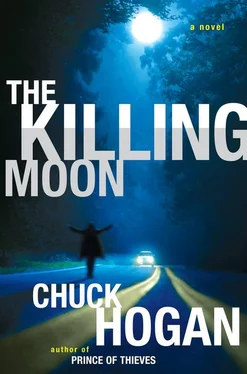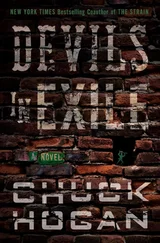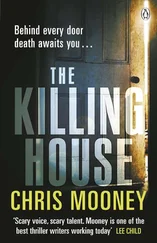Tracy sat on a stool in the open stall doorway, eating a tuna fish sandwich for dinner and watching the contented mother-to-be sitting on her hay bed. Rosalie’s brown cameloid face looked anything but restless. Tracy marveled at how peaceful and serene she appeared, her high neck so straight and proud. How fulfilled.
Living on a farm, Tracy came up against the reality of biology every day, in such a way that it was impossible not to dwell on her own animal nature. She thought about the tiny pouch of eggs she had been assigned at birth. A humble legacy dwindling month by month. She was still young enough that she shouldn’t worry, but Mithers women were known for their frugality, and squandering a precious commodity such as that was like heating an unused room or listening to a leaky faucet drip, drip, drip.
Tracy had received “the Talk” in sign language. Never before or since had her mother seemed more deaf than at that moment. In need of a convenient visual aid, she had taken Tracy to see the giant gumball machine outside Wal-Mart on their monthly visit to Rainfield for supplies.
What would it feel like, she wondered, once that quarter was dropped into the slot? The bright pink ball spiraling down to click against her brass door.
She ignored the horn the first time. It honked twice more in succession, like a signal, and she put down her sandwich on its wax paper and closed Rosalie’s stall door and went down the wood ramp. Her shadow stretched long across the chewed grass in the peachy, late-day light. Half hidden behind a handful of birches sprung up along the western fence was a parked car. A police car.
She ducked past the kitchen window in case her mother was there, then cut through the gate and ran along the fence. She tried livening up her hair with her fingers as she went, turning the corner and seeing Donny out of the car, waiting for her in the shade.
These days, it never even occurred to her to play hard to get. She ran up and kissed him and held him and rubbed his stubbled cheek. When he smiled, she kissed him again.
“Tuna fish,” he said.
She covered her mouth fast. “Sorry!”
He shook his head, kissing the knuckles over her lips.
“This is a surprise,” she said, holding him hard. “You look tired.”
He glanced through the peeling white tree trunks at the house. “I only have a minute. Wanted to make sure you knew not to call me at the station.”
“Okay.”
“Too crazy there. I’m never alone anymore. Page me if you need to get in touch.”
“I will, I will. How’s Pinty?”
Donny shrugged. “He mumbled in his sleep. I tried to convince the doctor that was a good sign.”
She put her ear against his chest, not to listen but to get as close to him as possible. “So much going on,” she said. “So many things at once.”
“Tell me about it.”
“And now Dillon Sinclair — my God. We locked the doors last night.”
“I think everyone did.”
She pulled back just enough to look up at him, feeling something in his manner. “What?”
“The guy doesn’t have a single violent episode in his past. Four years of prison — nothing.”
“I don’t know anything about him.”
“He was a magician,” said Donny, “some local junior champion or like that. He dropped out of high school senior year and supposedly went to Boston, worked as a street performer in the subways for a while, hustling money. He was essentially homeless when they tracked him down after his father died. He had been left some properties in the center of town. But Sinclair didn’t want to come back, so instead he used the rental income to relocate to Rainfield, where he started giving kids magic lessons in the back room of a music shop.”
“Oh, no,” said Tracy.
“Five kids came forward. He was convicted on only a single count.”
“Don’t tell me any more.”
“I grew up on the same street as him. He was weird even then. He came over once or twice to play, right after they moved in, but it never worked. He stole my mother’s cigarettes. I remember she tracked him down to a tree house behind their backyard. A nine-year-old, smoking. She didn’t let me play with him anymore after that.”
“Thank you, Mrs. Maddox.”
“The guy’s an authentic freak, but...”
“Are you saying you don’t think it’s him?”
He shrugged and looked down at her. “What do I know?”
She slipped her arms back under his. “That you miss me?”
“Yes,” he said, and they kissed again. She pushed his hair back from his ears. She was constantly touching his face, forever making him real, admiring this trophy she was amazed to have won.
He looked through the trees. “Your mother,” he said.
Tracy turned. There she was, outside the cowshed with her apron on. Yes — her mother still wore an apron while cooking. She also wore a whistle in case she needed to summon Tracy, though she rarely needed to use it, Tracy being so obedient.
Tracy’s anger toward her was unreasonable and an utter waste of time, so she squashed it, channeling all her energies into one more kiss. “You call me,” she told him.
Tracy’s mother had the whistle in her hand when Tracy came around the side of the house. Her worry fell away. Where’d you go?
Nowhere. Tracy moved her hands casually. Why?
Her mother glanced back near the tree grove — not right at it, but in that general direction — and Tracy reminded herself that her mother was deaf but not blind.
Dr. Gary Bolt untangled himself from the seatbelt of his Honda Prelude and rushed up the walkway, past his closed-for-the-day veterinary practice to the front door of his adjoining house.
The door was locked. Dr. Bolt knocked. He knocked again, harder. He stepped back to check the picture window that fronted the living room. The heavy gold curtains were closed, swaying.
Dr. Bolt moved to the seam of the door, speaking into it. “Frankie.”
The voice came hissing from inside. “Who’s with you? Are they with you?”
Dr. Bolt checked the street for onlookers. Not because of Frankie’s paranoia, but because of his own. Dr. Bolt had neighbors. He was an aging bachelor whispering through his own front door.
Dr. Bolt said, “Please, let me in.”
“They’ve been trading off cars. Passing every seven or eight minutes.”
“Frankie.” Dr. Bolt remained heroically patient. He put on his doctor’s voice. He employed reason. “You interrupted me with a patient. You said it was an emergency.”
“They’re coming after me. I know too much.”
Prior to this week, Dr. Bolt had known almost nothing of Frankie Sculp, not even his name. Only that, every few days, the boy crossed the farm fields to Dr. Bolt’s back kennel to retrieve the little packages left there by a young lady named Wanda. Yes, Dr. Bolt knew what was in those little packages. The same drugs Frankie had been snorting off the webbing between his thumb and forefinger every few hours since he had appeared on Dr. Bolt’s doorstep six days ago, saying he was scared, in trouble, and had no place else to go.
At the time, Dr. Bolt could hardly contain his excitement, nor believe his extraordinary good fortune. For he was at his very best helping strays.
Now here he was, one week later, standing out on his own welcome mat, begging Frankie to let him in.
“Frankie,” he said. “I am alone. Please. Open this door.”
“I checked your phones. For bugs.”
Dr. Bolt did not understand. “You’re seeing bugs now?”
“Police bugs! Surveillance! I checked every appliance.”
“ Every appliance? How did you—”
“And I opened up all the light switches and plug outlets. Anything near a power source. It’s for your sake too.”
Читать дальше












